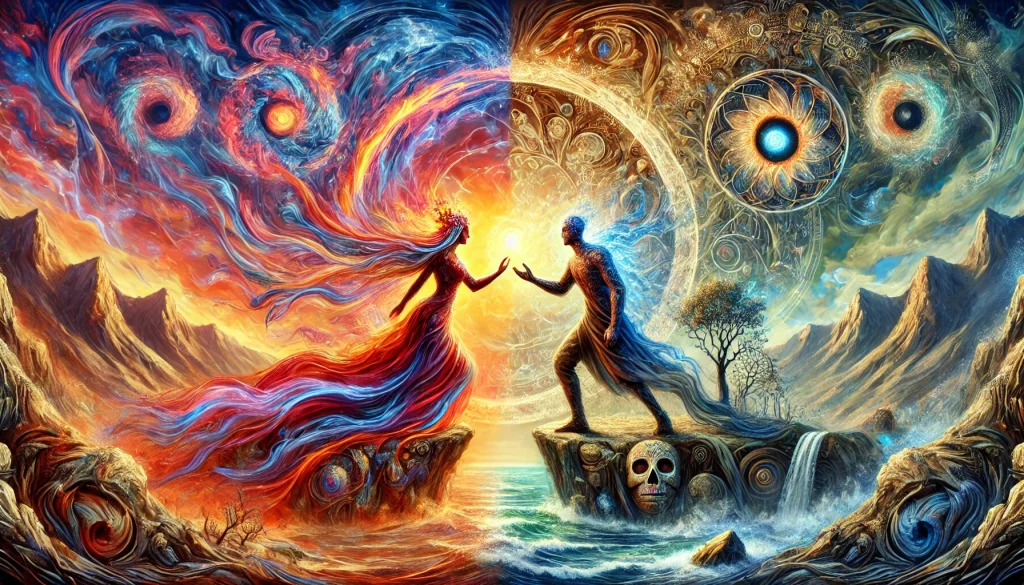As we delve deeper into the past, human sounds fade away. We’re now immersed in pure nature. Listen to the sounds without human or animal sources: the patter of rain, the whisper of wind, the crash of ocean waves. Occasionally, you might hear a thunderstorm or the deep rumble of an earthquake or volcano.
Before life on Earth, water was the primary source of sound – rushing in rivers, falling from the sky, crashing in waves, slowly eroding the sands of time.
We travel further back, to a time when Earth was forming from cosmic dust. For long periods, there is no sound – only silence. This silence extends beyond Earth, filling the universe.
Remember, sound is a facet of perception. It exists only because your ears translate the movement of air molecules into signals your brain interprets. My voice, guiding you on this journey, is itself a manifestation of sound, vocalizing imagination to help you envision a time and space without any sound.
As we approach the beginning of time, about 14 billion years in the past, reality itself seems to compress into nothingness. Yet our imagination can still penetrate this void.
Now, let’s move forward. The universe expands, matter and time emerge, and light pierces the darkness, bouncing off the first particles of matter. As time advances, this hot soup of natal matter cools, forming the first elements.
Stars ignite and die as we zip forward. Our solar system forms a mere 4.6 billion years ago, our sun ignites, and Earth comes into existence. At first, Earth is a hostile place, lacking any oxygen to carry sound waves. Unfathomable silence.
As Earth cools and develops a thin crust, we wait for that initial spark of life.
Somewhere, somehow, the first simple organisms emerge. Life at this stage is basic – no eyes, no ears, just perhaps the first iteration of touch.
Imagine taking a stroll in this distant past, passing by the ancient puddle where life began. The significance of that moment was imperceptible then – there was nothing to bear witness.
As single-cell organisms evolve, the sense of touch develops. Predatory behavior emerges, prompting life to consume other life. Gradually, life begins to recognize and consume light. The first shades of grey diversify, broadening the perceivable spectrum.
As the planet grows greener and oceans teem with life, senses become more complex. Information from reality is channeled through rudimentary senses, empowering life’s foray onto land.
The ability to hear underwater vibrations evolves into perceiving the soundscape of dry land. This leads to the emergence of humanoid life forms – including, eventually, you.
When did humans begin to speak? What were those first intentional animal sounds? These seemingly unnatural noises were the first deliberate connection between a life form’s inner world and the surrounding reality. Our vocal cords are part of an intricate system. As we refined our ability to produce and interpret sounds, our brains grew and developed.
While we commonly accept our senses as inputs to our reality, our emotions represent a aggregate sense, offering a fifth dimension of experience. With space as the third dimension and time as the fourth, the realm of emotions could be considered the fifth.
Human history has expedited the recording of emotions through storytelling, writing, music, and visual arts. Now, social media allows us to record entire lives. As we further our recording capabilities, we move closer to facilitating re-experience.
In the absence of humans, you can still hear nature. But once you introduce language, your immediate reality shifts dramatically. The words you speak indeed matter. Can you see more clearly now that this veil has been lifted slightly?
With our emotions, we fuel our perception bubbles and precondition our experiences based on what we focus on. Two lovers mesh their realities, deepening their connection step by step. A breakup shatters one’s world, even as the objective, scientific world remains unaffected.

















